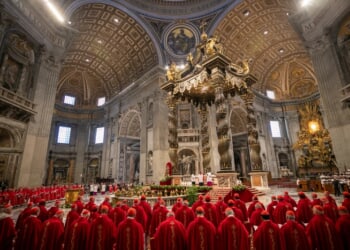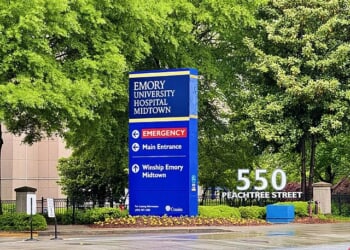The Republic of Korea is facing an essentially spiritual crisis.
A failed martial law attempt and a snap election expose South Korea’s deeper crisis: a nation divided by inequality, overwork, and stalled social change—far beyond its usual geopolitical threats.
South Korea’s soon-to-be former president, Yoon Suk-yeol, declared martial law during the late hours of December 3, citing the “anti-state forces” that had allegedly infiltrated the government. President Yoon then promised to “rebuild and protect a free South Korea which is falling into the depths of national ruin.”
Although martial law only lasted 157 minutes, it shook South Korea’s democratic system and plummeted the population’s trust in the government. Throughout that long night in Seoul, lawmakers scaled the walls of the National Assembly to gather and revoke the martial law declaration as military personnel dropped from helicopters, attempting to secure the perimeter.
President Yoon’s illegal and short-lived martial law declaration sent support for him and his conservative People’s Power Party (PPP) into a nosedive. Yoon’s impeachment trial began immediately after martial law was lifted and ended with the Supreme Court’s confirmation of his impeachment on April 4.
Now, the race for the highest office in the nation is in its final stretch, with the election to be held on June 3.
Who Are the Candidates for South Korea’s 2025 Elections?
Lee Jae-myung (representing the Democratic Party) is a former human rights and labor lawyer whose early political career was marked by years of defeat in local and national elections. However, his rotten luck turned around when he was elected mayor of Seongnam (a city south of Seoul) in 2010 and accumulated enough power to be later elected governor of the surrounding Gyeonggi Province in 2018.
His rise from regional to national politics was mired by controversy. Whether it be fighting allegations of corruption, abuse of power, or family scandals, Lee fostered a “love-him-or-hate-him” reputation. Lee wants to shift economic policy leftward and has likened himself to US president Franklin D Roosevelt: “We will change the graph of economic growth upward with a strong state-led economic revival policy. I’ll learn from Roosevelt, who overcame the Great Depression with left-wing policy.”
Lee’s focal policy pledge is to introduce a universal basic income nationwide and challenge South Korea’s power structure, wherein a handful of chaebols (massive family-owned corporations) control the majority of the country’s job opportunities and economic output.
Yoon’s martial law declaration boosted his popularity even further, as he was filmed jumping the fence of the National Assembly to reverse the executive decision.
Lee’s opponent, the PPP’s Kim Moon-soo, also served as the former governor of Gyeonggi Province from 2006 to 2014. Like Lee, he comes from a working-class background and was born the sixth of seven children when South Korea was the poorest country in the world. His protests against the dictatorial first president of Korea, Park Chung-hee, led him into the world of radical industrial labor activism.
Following Kim’s time as governor of Gyeonggi, he founded the short-lived Liberty Unification Party, a right-wing Christian fundamentalist party that was founded and dissolved within three months in 2020. Kim would rebound from this failure in 2022 as the labor minister in President Yoon’s cabinet.
Kim’s economic policies directly contrast with those of Lee. The PPP Leader said he would be a “job president” and has promoted business-friendly policies such as financial deregulation and tax relief.
As far as foreign policy goes, the PPP values South Korea’s alliance with the United States above all else and wishes to strengthen relations in spite of the Trump administration’s incoming tariffs. The Democrats approach the US relationship with a greater sense of ambiguity and seek greater cooperation with China and engagement with North Korea.
The rushed nature of the elections leaves the finer details of each candidate’s domestic and foreign policy much to be desired, as the time between the first presidential debate (May 18) and election day (June 3) is less than a month.
South Korea Is the Real Loser
South Korea has always been referred to as a “shrimp among whales,” always at the mercy of greater powers. Throughout the twentieth century, South Korea endured Japanese colonization, fought the brutal Korean War, and struggled for democracy. It finally emerged as the 12th richest country in the world. While the South Korean population is undoubtedly freer and wealthier than ever, the slog of social change has not kept up with rapid national development.
The opulence of a few key conglomerates, rapid urbanization, and a culture that values work performance over all else have yielded a politically divided and socially incohesive nation.
The central problem South Korea faces is not the threat of nuclear war from the communist North; it is not losing out to China and America’s global competition; it is the slow and agonizing spiritual atrophy of a nation continually chasing an unreachable idea of success.
The core principles driving South Korean business and politics towards “efficiency” are precisely what is killing the country from the inside. Should South Korea and its future leaders wish to prosper, they must put issues such as maternal and paternal leave, a shorter workweek, and housing subsidization at the forefront of the national consciousness.
However, as the status quo of economic and foreign policy concerns remains at the forefront of this snap election, South Korea will be the true loser, no matter who wins.
About the Author: Lake Dodson
Lake Dodson is an Assistant Editor for The National Interest. His interests are Korean-American relations, cybersecurity policy, and nuclear energy/weapons policy. He currently studies the Korean language and has completed courses on North-South Korean relations. His specific interests are nuclear energy policy, cyber-security, and the economy and politics of East Asia. He holds a BA from the University of Mississippi.
Image: Yeongsik Im / Shutterstock.com.


















